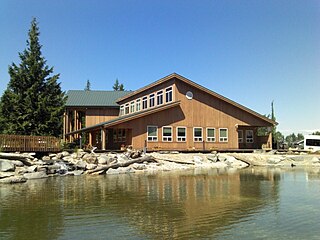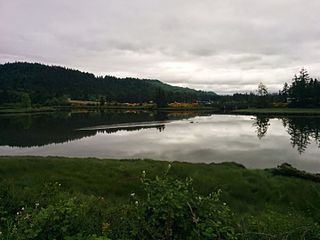
The Squaxin Island Indian Reservation is a Native American tribal government in western Washington state in the United States. The Squaxin Island Tribe is made up of several Lushootseed clans living along several inlets of southern Puget Sound:

The Puyallup, Spuyaləpabš or S’Puyalupubsh are a federally recognized Coast Salish Native American tribe from western Washington state, United States. They were relocated onto reservation lands in what is today Tacoma, Washington, in late 1854, after signing the Treaty of Medicine Creek with the United States. Today they have an enrolled population of 6,000, of whom 3,000 live on the reservation.

The Tulalip Tribes of Washington, formerly known as the Tulalip Tribes of the Tulalip Reservation, is a federally recognized tribe of Duwamish, Snohomish, Snoqualmie, Skagit, Suiattle, Samish, and Stillaguamish people. They are South and Central Coast Salish peoples of indigenous peoples of the Pacific Northwest Coast. Their tribes are located in the mid-Puget Sound region of Washington.

The Warm Springs Indian Reservation consists of 1,019 square miles (2,640 km2) in north-central Oregon, in the United States, and is occupied and governed by the Confederated Tribes of Warm Springs.

The Yakama Indian Reservation is a Native American reservation in Washington state of the federally recognized tribe known as the Confederated Tribes and Bands of the Yakama Nation. The tribe is made up of Klikitat, Palus, Wallawalla, Wanapam, Wenatchi, Wishram, and Yakama peoples.

The Confederated Tribes of the Chehalis Reservation is a federally recognized tribe of Upper and Lower Chehalis, Klallam, Muckleshoot, Nisqually, and Quinault peoples. They are one of the Northern Straits branch Central Coast Salish peoples of indigenous peoples of the Northwest Coast. Their tribe is located in southwest Washington.
Kamilche is an unincorporated community in Mason County, Washington, United States. Primarily a farm area, Kamilche is also the home to the Squaxin Indian Tribe. It is at the crossroads of U.S. Route 101 and State Route 108. Kamilche sits at the edge of Little Skookum Inlet, a finger waterway off of Puget Sound.

The Menominee Indian Reservation is an Indian reservation located in northeastern Wisconsin held in trust by the United States for the Menominee Tribe of Wisconsin. For the most part it is conterminous with Menominee County, Wisconsin and the town of Menominee. It is known in the Menominee language as Omāēqnomenēw-Otāēskonenan, "Menominee Thing Set Apart".
Squaxin Island is in the extreme southwestern part of Puget Sound in Mason County, Washington, United States. The island is an Indian reservation of the Native American Squaxin Island Tribe. It once contained a Washington State Park by the same name, which has since been closed, and the land returned to the Squaxin Tribe. The island's land area is 5.739 km2 (2.216 sq mi). There was no resident population as of the 2000 census.

The Flandreau Indian Reservation is an Indian reservation, belonging to the federally recognized Flandreau Santee Sioux Tribe of South Dakota. They are Santee Dakota people, part of the Sioux tribe of Native Americans. The reservation is located in Flandreau Township in central Moody County in eastern South Dakota, near the city of Flandreau.

In the United States, the use and possession of cannabis is illegal under federal law for any purpose, by way of the Controlled Substances Act of 1970. Under the CSA, cannabis is classified as a Schedule I substance, determined to have a high potential for abuse and no accepted medical use – thereby prohibiting even medical use of the drug. However, at the state level policies regarding the medical and recreational use of cannabis vary greatly, and in many states conflict significantly with federal law.

The legal history of cannabis in the United States began with state-level prohibition in the early 20th century, with the first major federal limitations occurring in 1937. Starting with Oregon in 1973, individual states began to liberalize cannabis laws through decriminalization. In 1996, California became the first state to legalize medical cannabis, sparking a trend that spread to a majority of states by 2016. In 2012, Washington and Colorado became the first states to legalize cannabis for recreational use.

The Skokomish Indian Tribe, formerly known as the Skokomish Indian Tribe of the Skokomish Reservation, and in its own official use the Skokomish Tribal Nation, is a federally recognized tribe of Skokomish, Twana, Klallam, and Chimakum people. They are a tribe of Southern Coast Salish indigenous people of the Pacific Northwest located in Washington. The Skokomish are one of nine bands of Twana people.

The Swinomish Indian Tribal Community, also known as the Swinomish Tribe, is a federally recognized Tribe located on Puget Sound in Washington. They are an Indigenous people of the Pacific Northwest that includes the Central and Coast Salish peoples who lived in the Samish and Skagit River valleys, nearby coasts, and islands. The Tribe's population includes Swinomish, Lower Skagit, Upper Skagit, Kikiallus, and Samish peoples.

Cannabis on American Indian reservations historically largely fell under the same regulations as cannabis nationwide in the United States. However, the August 2013 issuance of the Cole Memorandum opened discussion on tribal sovereignty as pertains to cannabis legalization, which was further explored as the states of Washington and Colorado legalized marijuana. A clarifying memo in December 2014 stated that the federal government's non-interference policies that applied to the 50 states, would also apply to the 326 recognized American Indian reservations. U.S. Attorney for Oregon, Amanda Marshall, stated that the clarification had been issued in response to legal questions from tribal nations, but that only three unnamed tribes, in California, Washington state, and "the Midwest" had stated explicit interest in legalizing.

Cannabis in South Dakota will be legal for medical use on July 1, 2021, having been legalized by a ballot initiative on November 3, 2020. Prior to then, cannabis was fully illegal, with South Dakota being the only U.S. state which outlawed ingestion of controlled substances. Testing positive for cannabis can be a misdemeanor offense. South Dakota would have become the first state in US history to legalize recreational and medical cannabis simultaneously, but an amendment legalizing recreational marijuana that was approved in the same election was struck down as unconstitutional the following February. The challenge claimed the amendment violated Amendment Z, the "Single-Subject Rule". This decision was appealed to the South Dakota Supreme Court with both sides making their case on April 28, 2021.

Mud Bay is the southernmost reach of Puget Sound, at Eld Inlet just outside the city limits of Olympia, Washington. The name Eld Inlet was officially bestowed after a member of the U.S. Navy's Wilkes Expedition, but "Mud Bay" is a local, informal adoption.

Cannabis in Washington relates to a number of legislative, legal, and cultural events surrounding the use of cannabis. On December 6, 2012, Washington became the first U.S. state to legalize recreational use of marijuana and the second to allow recreational marijuana sales. The state had previously legalized medical marijuana in 1998. Under state law, cannabis is legal for medical purposes and for any purpose by adults over 21.














